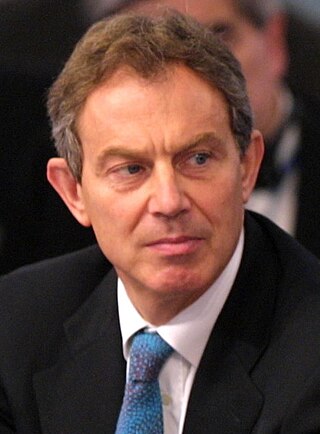
The 2001 United Kingdom general election was held on Thursday 7 June 2001, four years after the previous election on 1 May 1997, to elect 659 members to the House of Commons. The governing Labour Party was re-elected to serve a second term in government with another landslide victory with a 167 majority, returning 412 members of Parliament versus 418 from the 1997 general election, a net loss of six seats, though with a significantly lower turnout than before—59.4%, compared to 71.6% at the previous election. The number of votes Labour received fell by nearly three million. Tony Blair went on to become the only Labour Prime Minister to serve two consecutive full terms in office. As Labour retained almost all of their seats won in the 1997 landslide victory, the media dubbed the 2001 election "the quiet landslide".

The politics of the United Kingdom functions within a constitutional monarchy where executive power is delegated by legislation and social conventions to a unitary parliamentary democracy. From this a hereditary monarch, currently Charles III, serves as head of state while the Prime Minister of the United Kingdom, currently Rishi Sunak, serves as the elected head of government.

The 1997 United Kingdom general election was held on Thursday, 1 May 1997. The governing Conservative Party led by Prime Minister John Major was defeated in a landslide by the Labour Party led by Tony Blair, achieving a 179-seat majority.
The Social Democratic and Labour Party is a social-democratic and Irish nationalist political party in Northern Ireland. The SDLP currently has eight members in the Northern Ireland Assembly (MLAs) and two members of Parliament (MPs) in the House of Commons of the United Kingdom.
The Alliance Party of Northern Ireland (APNI), or simply Alliance, is a liberal and centrist political party in Northern Ireland. Following the 2022 Northern Ireland Assembly election, it was the third-largest party in the Northern Ireland Assembly, holding seventeen seats, and broke through by placing third in first preference votes in the 2019 European Parliament election and polling third-highest regionally at the 2019 UK general election. The party won one of the three Northern Ireland seats in the European Parliament, and one seat, North Down, in the House of Commons, the lower house of the Parliament of the United Kingdom.

Sir Jeffrey Mark Donaldson is a British politician who has served as leader of the Democratic Unionist Party (DUP) since June 2021. He has been the Member of Parliament (MP) for Lagan Valley since 1997, and leader of the DUP in the UK House of Commons since 2019. As of 2022, he is Northern Ireland's longest-serving MP.

West Tyrone is a parliamentary constituency in the United Kingdom House of Commons. The current MP for the constituency is Órfhlaith Begley of Sinn Féin.

Strangford is a parliamentary constituency in the United Kingdom House of Commons. The current MP is Jim Shannon of the DUP.

The 2005 United Kingdom general election was held on Thursday 5 May 2005, to elect 646 members to the House of Commons. The governing Labour Party, led by Tony Blair, won its third consecutive victory, with Blair becoming the second Labour leader after Harold Wilson to form three majority governments. However, its majority fell to 66 seats; the majority it won four years earlier had been of 167 seats. This was the first time the Labour Party had won a third consecutive election, and remains the party's most recent general election victory.

In the United Kingdom, a member of parliament (MP) is an individual elected to serve in the House of Commons, the lower house of the Parliament of the United Kingdom.
National University of Ireland (NUI) is a university constituency in Ireland, which currently elects three senators to Seanad Éireann. Its electorate is the graduates of the university, which has a number of constituent universities. It previously elected members to the House of Commons of the United Kingdom (1918–1921), to the House of Commons of Southern Ireland (1921) and to Dáil Éireann (1918–1936).

There are five types of elections in the United Kingdom: elections to the House of Commons of the United Kingdom, elections to devolved parliaments and assemblies, local elections, mayoral elections, and police and crime commissioner elections. Within each of those categories, there may also be by-elections. Elections are held on Election Day, which is conventionally a Thursday, and under the provisions of the Dissolution and Calling of Parliament Act 2022 the timing of general elections can be held at the discretion of the prime minister during any five-year period. All other types of elections are held after fixed periods, though early elections to the devolved assemblies and parliaments can occur in certain situations. The five electoral systems used are: the single member plurality system (first-past-the-post), the multi-member plurality, the single transferable vote, the additional member system, and the supplementary vote.

These are the results of the 2001 United Kingdom general election in Northern Ireland. The election was held on 7 June 2001 and all 18 seats in Northern Ireland were contested. 1,191,009 people were eligible to vote, up 13,040 from the 1997 general election. 68.63% of eligible voters turned out, up 1.2 percentage points from the last general election.

The 2015 United Kingdom general election in Northern Ireland was held on 7 May 2015 and all 18 seats were contested. 1,236,765 people were eligible to vote, up 67,581 from the 2010 general election. 58.45% of eligible voters turned out, an increase of half a percentage point from the last general election. This election saw the return of Ulster Unionists to the House of Commons, after they targeted 4 seats but secured 2.

The 2017 United Kingdom general election in Northern Ireland was held on 8 June 2017. All 18 seats in Northern Ireland were contested. 1,242,698 people were eligible to vote, up 5,933 from the 2015 general election. 65.6% of eligible voters turned out, an increase of 7.2 percentage points from the last general election.
The 1979 United Kingdom general election in Northern Ireland was held on 3 May with 12 MPs elected in single-seat constituencies using first-past-the-post as part of the wider general election in the United Kingdom.

The 1983 United Kingdom general election in Northern Ireland was held on 9 June with 17 MPs elected in single-seat constituencies using first-past-the-post as part of the wider general election in the United Kingdom. This was an increase of five seats, after the House of Commons Act 1979 had come into effect to account for the reduced representation after direct rule had been imposed since 1972. New constituencies were drawn up in 1982.

The 1992 United Kingdom general election in Northern Ireland was held on 9 April with 17 MPs elected in single-seat constituencies using first-past-the-post as part of the wider general election in the United Kingdom. 1,124,900 people were eligible to vote, up 34,511 from the 1987 general election. 70.02% of eligible voters turned out, down 2.6 percentage points from the last general election.
Opinion polling for the next United Kingdom general election is continually being carried out by various organisations to gauge voting intention. Most of the polling companies listed are members of the British Polling Council (BPC) and abide by its disclosure rules. The dates for these opinion polls range from the 2019 general election on 12 December to the present day.

The 2019 United Kingdom general election was held on 12 December 2019 to elect all 650 members of the House of Commons, including 18 seats in Northern Ireland. 1,293,971 people were eligible to vote, up 51,273 from the 2017 general election. 62.09% of eligible voters turned out, down 3.5 percentage points from the last general election. For the first time in history, nationalist parties won more seats than unionist parties.















